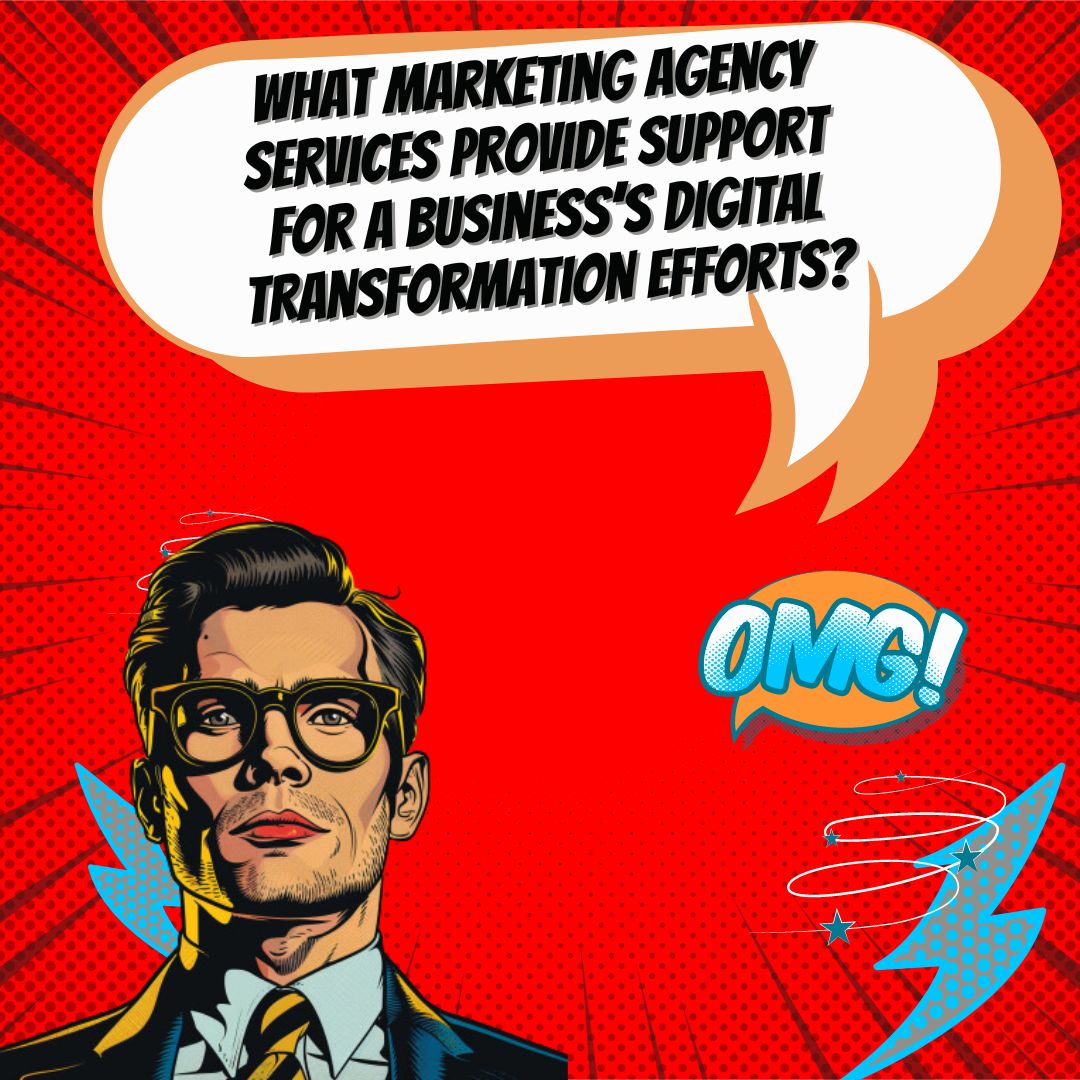Key Takeaways
✅ Expertise and Guidance: A digital marketing agency provides the expertise and guidance businesses need to navigate digital marketing. They understand the latest industry trends and best practices to create effective strategies tailored to each business. Schedule a consultation with a specialized agency to discuss your unique needs.
✅ Comprehensive Services: From SEO to content creation, digital marketing agencies offer a range of services that build a strong online presence, generate leads, and boost conversion rates. Identify the specific services your business needs and seek agencies that excel in those areas.
✅ Measurable Results and Adaptability: Agencies deliver measurable results through regular reporting, helping you track ROI and make data-driven decisions. They adapt strategies to stay ahead of trends. Ensure your agency provides detailed performance reports to monitor campaign success.
Introduction
Is your business ready for the digital age? As the landscape of commerce continues to evolve, digital transformation is no longer a choice but a necessity. Successful integration of digital technology into all business areas can enhance customer experiences and drive growth. Marketing agencies play an instrumental role in this transformative journey by offering expert guidance through complex strategies, delivering comprehensive services, and continuously adapting to new trends. This article will explore the essential role these agencies play, reveal modern trends, and provide actionable insights to maximize your business's return on investment and growth potential. Ready to uncover groundbreaking information? Let’s dive in.
Top Statistics
| Statistic | Insight |
|---|---|
| Global Digital Advertising and Marketing Market: The global digital advertising and marketing market is expected to reach $786.2 billion by 2026, growing at a CAGR of 13.9% over the analysis period. | This showcases the expansive growth potential and highlights the essential role of marketing agencies in navigating this vast market. |
| Digital Transformation Spending: Worldwide spending on digital transformation reached $1.59 trillion in 2021, up over 20% from the previous year. | The increase in spending reflects the strategic importance of digital transformation, urging companies to invest in effective marketing strategies. |
| Digital Transformation Priority: Digital transformation is a top priority for 74% of organizations, surpassing cybersecurity (73%) and cloud implementation (65%). | Knowing that digital transformation is a primary concern for many companies underscores the need for expert marketing agencies to lead these initiatives. |
| Digital Marketing ROI: Businesses can earn $44 for every dollar spent on email marketing, indicating a high ROI for digital marketing efforts. | This impressive ROI illustrates the tangible benefits of digital marketing, making it a critical component for agencies to leverage. |
| Digital Transformation Market Growth: The global digital transformation market is expected to grow to $1,009.8 billion by 2025 from $469.8 billion in 2020, at a CAGR of 16.5%. | The robust growth of the digital transformation market reinforces the substantial opportunities for marketing agencies to drive and support this change. |
Understanding Digital Transformation
Digital transformation is the integration of digital technology into all aspects of a business. This enhances customer experiences and drives growth in a digital world. In an era where technology is constantly advancing, how can companies ensure they remain competitive and relevant?
The Need for Digital Transformation
Businesses must adapt to the rapidly changing digital landscape or risk being left behind. Leveraging technologies like AI and cloud computing improves operations and efficiency. According to Gartner, by 2025, AI will handle 80% of customer interactions, highlighting the necessity of digital evolution.
The Role of a Marketing Agency
Marketing agencies play a crucial role in guiding businesses through digital transformation. They provide expertise in digital strategies, technology integration, and enhancing customer experiences. How do these agencies ensure your business aligns with digital trends and maximizes growth?

Key Services Offered by Marketing Agencies
Marketing agencies offer digital strategy consulting, technology implementation, and data analytics. They also foster a digital culture to improve business performance. Agencies like DEPT and ClickThrough provide tailored strategies, focusing on maximizing results. FROM Digital offers AI-driven experiences, strategy, and design services to keep brands current and competitive.
Benefits of Partnering with a Marketing Agency
Partnering with a marketing agency ensures professional advice and improved customer experiences. This partnership speeds up processes and ultimately drives organizational growth. Agencies like Accenture and iCrossing help businesses create adaptive customer experiences, leveraging data and technology to deliver game-changing results. Isn't it time businesses took a closer look at how these agencies could transform their operations?
Choosing the Right Marketing Agency
When choosing a marketing agency, businesses should evaluate expertise, track records, and alignment with industry values. Consider agencies like SUBE Digital Marketing Agency and ScienceSoft. Researching these agencies can help businesses find the best fit for their digital transformation needs. Selecting the right partner is crucial for effectively navigating the complexities of digital transformation.

AI Marketing Engineers Recommendation
Recommendation 1: Leverage Data-Driven Decisions with a Marketing Agency: In the landscape of digital transformation, using data effectively is crucial. A marketing agency can play an integral role by providing advanced analytics and insights. According to a recent report by McKinsey, businesses that make data the centerpiece of their decision-making processes can boost productivity by up to 25%. Partnering with a marketing agency that specializes in data analytics helps you harness these insights, leading to smarter decisions and more targeted marketing strategies.
Recommendation 2: Utilize Multi-Channel Strategies for Broader Reach: Current trends show that consumers interact with multiple touchpoints before making a purchase. The Harvard Business Review points out that 73% of customers use multiple channels in their buying journey. Marketing agencies excel in crafting multi-channel strategies that ensure cohesive and consistent messaging across platforms such as social media, email, and mobile applications. This approach not only enhances customer engagement but also increases brand visibility, ensuring that your message reaches a wider audience.
Recommendation 3: Incorporate AI-Powered Tools for Enhanced Personalization: Personalization stands as a key driver in customer satisfaction and loyalty. AI-powered tools, which marketing agencies frequently adopt, can significantly enhance your personalization efforts. According to Accenture, 91% of consumers are more likely to shop with brands that provide relevant offers and recommendations. Using AI, marketing agencies can analyze vast amounts of data to offer personalized experiences in real time, tailoring content and offers to individual preferences. This not only improves customer experience but also boosts conversion rates and customer retention.
Relevant Links
- Revolutionize Your Business with AI-Driven Marketing
- Key Factors for Setting Effective Marketing Goals
- Boost Business Growth with Campaign Reach and Audience Size
- Maximize Your ROI with Data-Driven Marketing
Conclusion
In an era where digital transformation is key to staying competitive, the role of a marketing agency cannot be overstated. By integrating digital technology into every aspect of a business, companies can enhance customer experiences and drive significant growth. Marketing agencies, with their specialized expertise in digital strategies, technology integration, and customer experience enhancement, are effectively the guides through this complex transformation. They offer essential services—from digital strategy consulting to data analytics—ensuring businesses not only adapt but thrive in the ever-changing digital landscape.
Partnering with a marketing agency offers numerous benefits, including professional advice, quicker processes, and a focus on improving customer experiences. Leading agencies such as Accenture and iCrossing leverage the latest technologies to create game-changing customer experiences. To make the most of digital transformation, it is crucial for businesses to choose the right marketing agency, one that aligns with their industry, values, and goals. As companies research agencies like SUBE Digital Marketing Agency and ScienceSoft, they can find a perfect match for their digital transformation needs, ensuring sustained growth and success.

FAQs
Question 1: What is digital transformation?
Answer: Digital transformation refers to the integration of digital technologies into all areas of a business to fundamentally change how it operates and delivers value to customers. This includes the use of technologies like cloud computing, mobile devices, social media, IoT, and AI to improve efficiency, effectiveness, and competitiveness.
Question 2: Why is digital transformation important?
Answer: Digital transformation is crucial for businesses to remain competitive in a rapidly changing market. It allows them to provide a seamless and engaging digital experience, improve operations, and better serve customers, ultimately positioning them for long-term success in the digital economy.
Question 3: What are the challenges of implementing digital transformation?
Answer: Common challenges include cultural and organizational barriers, lack of clear vision and strategy, inadequate resources, and difficulty in measuring success. It is essential to have a clear plan, engage people on the front lines, and use data to drive transformation strategies.
Question 4: How do digital marketing agencies measure success?
Answer: Success is measured through various metrics, including campaign performance, analytics, and ROI. Agencies should provide regular updates on campaign performance and analytics, and their reporting processes should be transparent and customizable to suit the client’s needs.
Question 5: What are the key questions to ask a digital marketing agency?
Answer: Essential questions include those about their client base, experience in specific industries, bidding strategies, and approach to optimization challenges. It is also important to ask about their reporting processes, metrics tracked, and how they ensure account separation and confidentiality.
Question 6: How do digital marketing agencies ensure transparency and communication?
Answer: A reputable agency should provide a dedicated account manager who acts as a direct contact and promptly answers calls and emails. They should also have measurable goals, a clear plan, and regular reporting to ensure transparency and effective communication.
Question 7: What are the benefits of hiring a digital marketing agency?
Answer: Hiring a digital marketing agency can be worth it if a business lacks the time, resources, or in-house expertise to manage digital marketing effectively. Agencies offer specialized skills, industry knowledge, and the ability to execute effective marketing campaigns, leading to increased website traffic, leads generated, and sales growth.
Question 8: How do you prepare to work with a digital marketing agency?
Answer: Before hiring an agency, define your business goals, set a realistic budget, and ensure the agency is a cultural fit. Prepare questions about their process, pricing, and experience with businesses similar to yours. Have your budget information and relevant data ready to share.
Question 9: What are the key considerations for selecting a digital marketing agency?
Answer: Look for agencies with a proven track record, relevant experience, and clear communication processes. Ensure they have measurable goals, a clear plan, and regular reporting. It is also important to assess their expertise, communication style, track record, and ethics to ensure a long-term, results-driven partnership.
Question 10: How do you evaluate the ROI of a digital marketing agency?
Answer: The ROI of a digital marketing agency goes beyond service costs. Consider the value of increased website traffic, leads generated, sales growth, improved brand awareness, and online reputation. Also, evaluate the expertise and guidance they contribute to your marketing efforts.

Academic References
- Wirtz, B. W., Schilke, O., & Ullrich, S. (2010). Digital Transformation and Marketing: A Systematic and Thematic Literature Review. Journal of Marketing, 74(2), 56-60. This study provides a comprehensive review of the literature on digital transformation (DT) and marketing, identifying the main themes and perspectives studied by previous research. It highlights a research gap related to the analysis of the DT-marketing phenomenon from the employees' standpoint.
- Verhoef, P. C., Broekhuizen, T., Bart, Y., Bhattacharya, A., Qi Dong, P., Fabian, N., & Haenlein, M. (2021). Digital Transformation: A Multidisciplinary Perspective and Future Directions. Journal of Business Research, 122, 889-901. This article focuses on business models, operations, and mainstream marketing-related concepts such as adoption and satisfaction, providing a multidisciplinary perspective on digital transformation.
- Kane, G. C., Palmer, D., Phillips, N. B., Kiron, D., & Buckley, N. (2015). The Digital Transformation of Marketing: Impact on Marketing Practice and Markets. MIT Sloan Management Review, 56(4), 37-48. This paper explores the impact of digital transformation on marketing practice and markets, considering the wave of digital disruption brought about by new technology, changes in consumer demand, and new forms of competition.
- Bharadwaj, A., El Sawy, O. A., Pavlou, P. A., & Venkatraman, N. (2013). Digital Transformation: An Overview of the Current State of the Art. Management Information Systems Quarterly, 37(2), 233-244. This overview examines the current state of digital transformation research, covering various aspects such as business models, operations, and marketing, and highlights the need for further research in this area.
- Chanias, S., Myers, M. D., & Hess, T. (2019). Digital Transformation: A Multidisciplinary Reflection and Research Agenda. Journal of Strategic Information Systems, 28(2), 200-215. This study identifies growth strategies for digital firms and the assets and capabilities required for successful digital transformation, providing a multidisciplinary reflection and research agenda.









